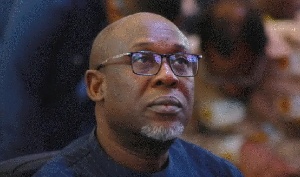Business News of Monday, 2 June 2025
Source: www.ghanawebbers.com
Fidelity Bank committed to climate resilience as core business imperative - Atta Gyan
Fidelity Bank is taking a proactive approach to climate risk. Mr. Atta Yeboah Gyan explained that they identified climate risk as a key issue. This was done through their double materiality assessment, part of their governance processes.
The bank has established a strong Environmental and Social Management System (ESMS). This system aligns with IFC Performance Standards and the Bank of Ghana’s Sustainable Banking Principles.
To manage climate risks effectively, Fidelity Bank conducted its first portfolio-level climate scenario analysis. This analysis covered both Retail and Corporate & Investment Banking segments. It included an internal review of potential disruptions to branches and ATMs.
The results helped create detailed climate risk heatmaps. These maps enhance the bank’s understanding of exposure and resilience.
Fidelity Bank's three-year Climate Implementation Plan supports Ghana’s Nationally Determined Contributions (NDCs). The plan ensures financing aligns with national climate adaptation priorities.
The bank is integrating climate risk screening into credit assessments. They focus on vulnerable sectors like agriculture, infrastructure, and SMEs. Mr. Gyan mentioned tools being piloted to assess drought and flood vulnerability in agriculture.
Training frontline staff is also a priority for the bank. They aim to help staff recognize adaptation indicators in markets where solutions are not obvious.
Beyond managing internal risks, Fidelity Bank seeks to unlock private finance for adaptation in Ghana. They launched an Electric Vehicle (EV) Financing product to promote green transport.
Additionally, they offer asset finance products for schools and hospitals to adopt solar energy. This reduces their exposure to energy disruptions.
Mr. Gyan highlighted the success of their Bridge-in-Agriculture initiative. It has created over 12,000 jobs and empowered more than 20,000 smallholder farmers, mostly women.
He believes blended finance is crucial for expanding lending to underserved areas. Working with development partners can help de-risk climate-smart investments.
Looking ahead, Fidelity Bank made recommendations for the Global Center on Adaptation (GCA). They urged support for technical capacity-building in commercial banks regarding climate risk tools.
They also called for de-risking instruments like guarantees to boost adaptation finance appetite among banks. Co-developing pipelines of bankable adaptation projects is essential too.
Promoting standardized climate risk data will improve decision-making across the banking sector.
Mr. Gyan concluded by emphasizing that adaptation is essential for resilience and can be profitable with proper partnerships and policies. Fidelity Bank aims to lead this effort in Ghana while collaborating with various stakeholders.











